 W
WGeneral Sir James Edward Alexander was a Scottish traveller, author and soldier in the British Army.
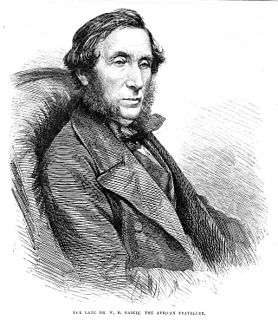 W
WWilliam Balfour Baikie was a Scottish explorer, naturalist and philologist.
 W
WRobert Michael Ballantyne was a Scottish author of juvenile fiction who wrote more than 100 books. He was also an accomplished artist, and exhibited some of his water-colours at the Royal Scottish Academy.
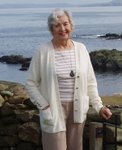 W
WElizabeth Balneaves was a Scottish author, painter and filmmaker.
 W
WWilliam Edward Baxter was a Scottish businessman, Liberal politician and travel writer.
 W
WJohn Bell was a Scottish anatomist and surgeon.
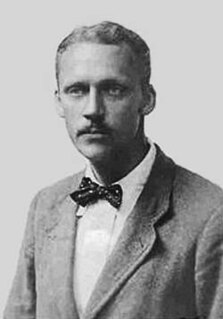 W
WWalter Dalrymple Maitland Bell, known as Karamojo Bell, was a Scottish adventurer, big game hunter in East Africa, soldier, decorated fighter pilot, sailor, writer, and painter.
 W
WFred Bremner (1863–1941) was a Scottish photographer. His portraiture work in British India, spanning 1882 to 1922, preserves a record of life in the period.
 W
WJames Bruce of Kinnaird was a Scottish traveller and travel writer who spent more than a dozen years in North Africa and Ethiopia, where he was the first European to trace the origins of the Blue Nile.
 W
WPatrick Brydone, FRSE, FRS, FSA (Scot), FSA was a Scottish traveller and author who served as Comptroller of the Stamp Office.
 W
WRev Claudius Buchanan DD FRSE was a Scottish theologian, an ordained minister of the Church of England, and an evangelical missionary for the Church Missionary Society. He served as Vice Provost of the College of Calcutta in India.
 W
WWilliam Gordon Burn Murdoch was a Scottish painter, travel writer and explorer. Murdoch travelled widely including India and both the Arctic and the Antarctic. He is said to be the first person to have played the bagpipes in the Antarctic. He published several travel books as well as being an accomplished artist. A cape in the South Orkneys is named in his honour.
 W
WWilliam Archibald Cadell FRS FRSE FGS MWS (1775–1855) was a Scottish industrialist and mathematician, also known as a travel writer.
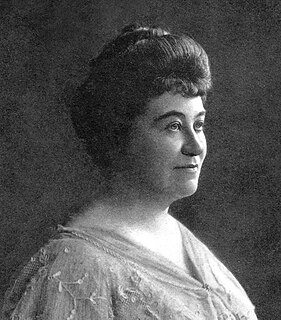 W
WIsabella "Ella" Robertson Christie was a pioneering Scottish traveller and explorer, landowner, gardener and author.
 W
WJohn Crawfurd was a Scottish physician, colonial administrator and diplomat, and author. He is now best known for his work on Asian languages, his History of the Indian Archipelago, and his role in founding Singapore as the last British Resident of Singapore; the position of Resident was replaced by the Governor of the Straits Settlements.
 W
WRobert Bontine Cunninghame Graham was a Scottish politician, writer, journalist and adventurer. He was a Liberal Party Member of Parliament (MP); the first ever socialist member of the Parliament of the United Kingdom; a founder, and the first president, of the Scottish Labour Party; a founder of the National Party of Scotland in 1928; and the first president of the Scottish National Party in 1934.
 W
WJames Herbert Curle was a Scottish mining engineer, traveller, writer, eugenicist, and philatelist. He wrote The Gold Mines of the World as well as autobiographical and travel works of a philosophical turn.
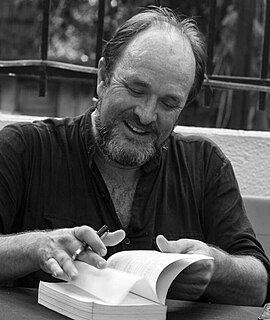 W
WWilliam Dalrymple is a Scottish historian and writer, art historian and curator, as well as a broadcaster and critic. His books have won numerous awards and prizes, including the Duff Cooper Memorial Prize, the Thomas Cook Travel Book Award, the Sunday Times Young British Writer of the Year Award, the Hemingway, the Kapuściński and the Wolfson Prizes. He is also one of the co-founders and co-directors of the annual Jaipur Literature Festival.
 W
WLady Florence Caroline Dixie was a Scottish writer, war correspondent, and feminist. Her account of travelling Across Patagonia, her children's books The Young Castaways and Aniwee; or, The Warrior Queen, and her feminist utopia Gloriana; or, The Revolution of 1900 all deal with feminist themes related to girls, women, and their positions in society.
 W
WJohn Duncan (1805–1849) was a Scottish traveller in Africa.
 W
WHenry Faulds was a Scottish doctor, missionary and scientist who is noted for the development of fingerprinting.
 W
WGeorge Fleming (1833–1901) was a Scottish veterinary surgeon. He was a prolific writer, and supported the passing of the Veterinary Surgeons Act 1881, which regulated the profession, in his time as President of the Royal College of Veterinary Surgeons.
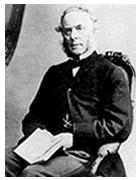 W
WRobert Fortune was a Scottish botanist, plant hunter and traveller, best known for introducing around 250 new ornamental plants, mainly from China, but also Japan, into the gardens of Britain, Australia, and the USA. He also played a role in the development of the tea industry in India in the 19th century.
 W
WJames Baillie Fraser was a Scottish travel writer and artist who illustrated and wrote about Asia Minor and India. Some of his watercolours made in the picturesque style represent early views of India and Persia.
 W
WSir John Foster Fraser was a Scottish travel author. In July 1896, he and two friends, Samuel Edward Lunn and Francis Herbert Lowe, took a bicycle trip around the world riding Rover safety bicycles. They covered 19,237 miles in two years and two months, travelling through 17 countries and across three continents. He documented the trip in the book Round the World on a Wheel.
 W
WJohn Galt was a Scottish novelist, entrepreneur, and political and social commentator. Galt has been called the first political novelist in the English language, due to being the first novelist to deal with issues of the Industrial Revolution.
 W
WJohn Geddie (1848–1937) was a journalist and author of several books mainly on the subject of Edinburgh. His earliest books were about foreign parts but it is not known whether he actually visited these places.
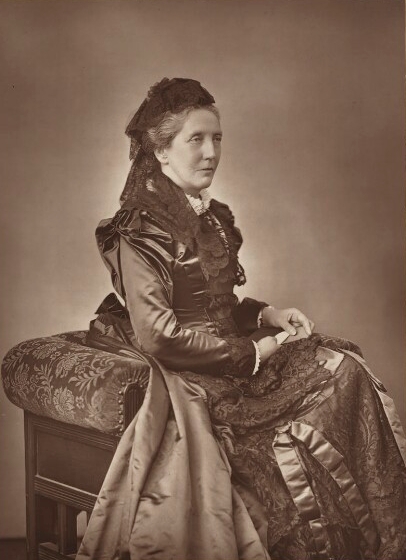 W
WConstance Frederica “Eka” Gordon-Cumming was a noted Scottish travel writer and painter. Born in a wealthy family, she travelled around the world and painted described scenes and life as she saw them. She was a friend and influencer of the travel writers and artists Marianne North and Isabella Bird.
 W
WRichard Alexander Steuart Gordon was a Scottish author born in Banff, Scotland who wrote numerous science fiction novels, encyclopedias, and travel guides. Gordon's novels are noted for their mix of historical fact and creative fictionalized events.
 W
WSir Thomas Edward Gordon was a Scottish soldier, diplomat, and traveler. A British Army officer, he fought in India, served as a diplomat in Tehran, and travelled across the Pamirs. These days he is primarily remembered as an author of several books about India, Persia, and Central Asia of the 19th century.
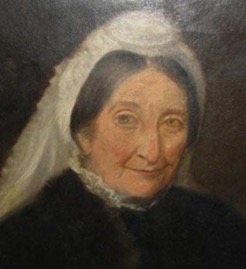 W
WElizabeth Caroline Hamilton Gray was a Scottish historian and travel author, born in Alva, Clackmannanshire, as the eldest daughter of James Raymond Johnstone and granddaughter of the colonial businessman John Johnstone. After marrying John Hamilton Gray, a priest and genealogist, in June 1829, Gray moved to Bolsover Castle in England, where she lived until shortly before her death.
 W
WDr. Alexander Hamilton was a Scottish-born doctor and writer who lived and worked in Annapolis in 18th-century colonial Maryland. Historian Leo Lemay says his 1744 travel diary Gentleman's Progress: The Itinerarium of Dr. Alexander Hamilton is "the best single portrait of men and manners, of rural and urban life, of the wide range of society and scenery in colonial America." His diary covered Maryland to Maine; and biographer Elaine Breslaw says he encountered:the relatively primitive social milieu of the New World. He faced unfamiliar and challenging social institutions: the labor system that relied on black slaves, extraordinarily fluid social statuses, distasteful business methods, unpleasant conversational quirks, as well as variant habits of dress, food, and drink."
 W
WRobert Hay was a Scottish traveller, antiquarian, and early Egyptologist. He was born in Duns Castle, Berwickshire. During his service in the Royal Navy he visited Alexandria, Egypt, in 1818.
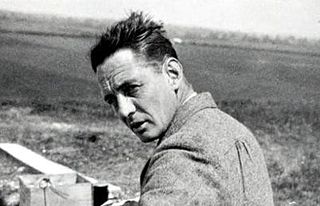 W
WAlexander Keiller FSA FGS was a Scottish archaeologist, pioneering aerial photographer, businessman and philanthropist who worked on an extensive prehistoric site at Avebury in Wiltshire, England.
 W
WPeter Kerr is a best-selling author of travel books and fiction. He re-located from Scotland to Mallorca in the 1980s and began his writing career while working as a farmer.
 W
WDr Robert Kerr FRSE FAS FRCSE was a Scottish surgeon, writer on scientific and other subjects, and translator.
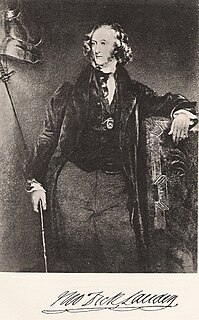 W
WSir Thomas Dick Lauder of Fountainhall, 7th Baronet, FRSE FSA(Scot) LLD was a Scottish author. He served as Secretary to the Board of Manufactures (1839–), on the Herring Fisheries Board, at the Royal Institution for the Encouragement of the Fine Arts, and as Deputy Lieutenant of both counties of Moray and Haddington.
 W
WWilliam Lithgow was a Scottish traveller, writer and alleged spy. He claimed at the end of his various peregrinations to have tramped 36,000 miles (57,936km) on foot.
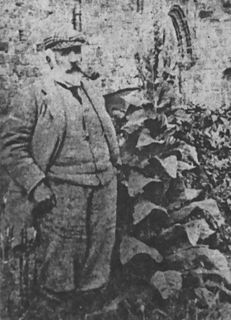 W
WWilliam Logan (1841–1914) was a Scottish officer of the Madras Civil Service under the British Government. Before his appointment as Collector of Malabar, he had served in the area for about twenty years in the capacity of Magistrate and Judge. He was conversant in Malayalam, Tamil and Telugu. He is remembered for his 1887 guide to the Malabar District, popularly known as the Malabar Manual
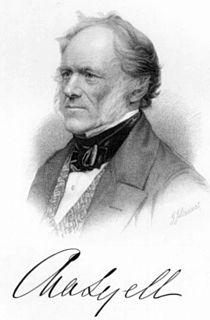 W
WSir Charles Lyell, 1st Baronet, was a Scottish geologist who demonstrated the power of known natural causes in explaining Earth's history. He is best known as the author of Principles of Geology (1830–33), which presented to a wide public audience the idea that Earth was shaped by the same natural processes still in operation today, operating at similar intensities. The philosopher William Whewell termed this gradualistic view "uniformitarianism" and contrasted it with catastrophism, which had been championed by Georges Cuvier and was better accepted in Europe. The combination of evidence and eloquence in Principles convinced a wide range of readers of the significance of "deep time" for understanding the Earth and environment.
 W
WCharles Macfarlane (1799–1858) was a Scottish writer, known as much for his historical and travel works as he was for his novels.
 W
WJohn MacGregor, nicknamed Rob Roy after a renowned relative, was a Scottish explorer, travel writer and philanthropist. He is generally credited with the development of the first sailing canoes and with popularising canoeing as a sport in Europe and the United States. He founded the British Royal Canoe Club (RCC) in 1866 becoming its first Captain and also founded American Canoe Association in 1880.
 W
WGeorge Reid Millar DSO MC was a Scottish journalist, soldier, author and farmer. He was awarded the Military Cross (MC) in early 1944 for escaping from Germany while a prisoner of war and making it back to England, which he wrote about in his 1946 book Horned Pigeon.
 W
WDr. John Moore FRSE was a Scottish physician and travel author. He also edited the works of Tobias Smollett.
 W
WPatrick Neill was a Scottish printer and horticulturalist, known as a naturalist. A founding member, and the first secretary, of both the Wernerian Natural History Society (1808–49) and the Caledonian Horticultural Society (1809–49), he is mainly remembered today for having endowed the Neill Medal of the Royal Society of Edinburgh.
 W
WGeorge Neilson Patterson also known as Khampa Gyau and Patterson of Tibet, was a Scottish engineer and missionary who served as medical officer and diplomatic representative of the Tibetan resistance movement during the Chinese invasion of Tibet.
 W
WProf William Richardson FRSE was a Scottish classicist and literary scholar. In 1783 he was a joint founder of the Royal Society of Edinburgh.
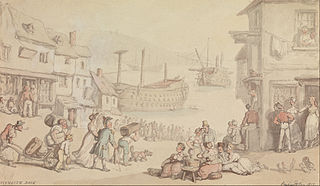 W
WJanet Schaw, traveller and diarist, was born between 1730 and 1740 in Lauriston Edinburgh. The third cousin, once removed of Sir Walter Scott, she was born into an old Scottish family. Little is known about her early life, but during her travels to the Antigua, St. Christopher, North Carolina, and Portugal in 1774–1776, she kept a journal, "blessedly unaware that as she jotted down her opinions and descriptions that she was a writing for posterity a document of rare interest and importance, now which as far as we know, and especially as it bears on the Scottish phase of American colonial history, is unique". After her return to Britain she lived in Edinburgh and Plymouth, where she met King George III and Queen Charlotte. Janet died in 1800.
 W
WFaraz Shibli is a British travel writer, author and adventurer.
 W
WTobias George Smollett was a Scottish poet and author. He was best known for his picaresque novels, such as The Adventures of Roderick Random (1748), The Adventures of Peregrine Pickle (1751) and The Expedition of Humphry Clinker (1771), which influenced later novelists, including Charles Dickens. His novels were amended liberally by printers; a definitive edition of each of his works was edited by Dr O. M. Brack Jr to correct such variations.
 W
WElizabeth Isabella Spence was a Scottish novelist and travel writer.
 W
WRobert Louis Stevenson was a Scottish novelist, poet and travel writer, most noted for Treasure Island, Kidnapped, Strange Case of Dr Jekyll and Mr Hyde, and A Child's Garden of Verses.
 W
WSir Charles Wyville Thomson was a Scottish natural historian and marine zoologist. He served as the chief scientist on the Challenger expedition; his work there revolutionised oceanography and led to his knighthood.
 W
WKenneth White is a Scottish poet, academic and writer.
 W
WPeter Williamson, also known as "Indian Peter", was a Scottish memoirist who was part-showman, part-entrepreneur and inventor. Born in a croft in Aberdeenshire, he was forcibly taken to North America at an early age, but succeeded in returning to Scotland where he eventually became a well-known character in 18th century Edinburgh. He adopted the pseudonym "Indian Peter" due to his time spent with native Americans and his self-exploitation of this in an autobiography and by touring Scotland and England in the guise of a "Red Indian".